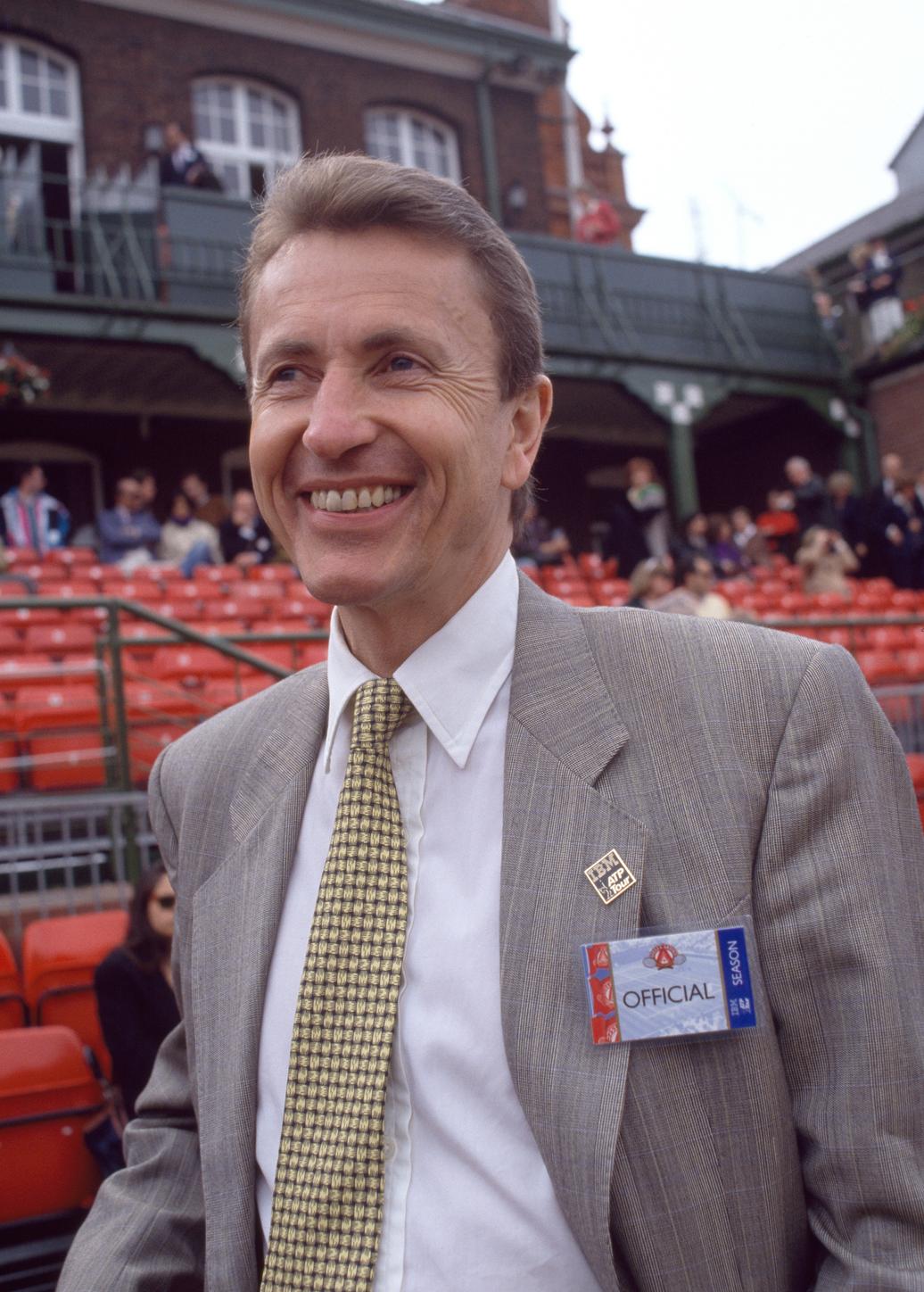RICHARD
EVANS

- Biography
- Career Highlights
SUPREME STORYTELLER
When it comes to understanding the occurrences that define public life, there is no substitute for the proximity and immediacy of the on-site journalist. For more than six decades, no one in tennis has held a candle to the breadth and depth delivered by 2024 International Tennis Hall of Fame inductee Richard Evans.
YOUNGER YEARS
Perhaps Evans’ very origins gave him the ability to be in the thick of significant events. The child of British parents, Evans was born in Paris on February 10, 1939. His father, C.M. “Harry” Evans, had been one of the founders of what would become one of the world’s most prestigious accounting firms, Price Waterhouse, running its office in Paris. Just over a year after Evans’ birth, the German military force was swiftly advancing through Western Europe. As Evans wrote in his memoir, The Roving Eye, “And so we joined the pathetic ragtag army of refugees streaming south as Hitler’s forces burst through the paper-thin Maginot Line, skirted whatever resistance remained and descended on Paris.” Arriving in Bordeaux, the Evans family was able to book passage on a ship to Great Britain.
A TENNIS MAINSTAY
In his teens, Evans began a career in journalism and served time in the British army. In June 1960, he commenced work on the sports desk of a London newspaper, The Evening Standard. This was also the month that tennis entered the picture, when Evans was assigned the task of collaborating on columns for former world number one, Althea Gibson. From there, Evans’ immersion in tennis would continue for decades. “My loyalties are to the game, not to any political faction,” wrote Evans in Open Tennis, “and it never hurts to be reminded that it is the players who make it live.”
With passion and elegance, Evans became tennis’ premier man on the spot. Throughout his lengthy career, he has covered more than 200 Grand Slam tournaments. Beyond those premier events, Evans has crisscrossed the globe repeatedly, covering dozens of Davis Cup ties and hundreds of tournaments. All of this has been accomplished with graceful prose, be it under deadline pressure for various newspapers, or with the perspective brought to Evans’ resume of more than 20 books.
LITERARY PROWESS
The Evans tennis book collection covers an unsurpassed range of topics and genres. Evans has collaborated with such tennis notables as veteran pro Marty Riessen, psychologist Allen Fox, trainer Bill Norris, and fellow 2024 inductee, Vijay Amritraj to cover many moments and people of tennis history.
Evans crafted insightful portraits of such complicated stars as Ilie Nastase and John McEnroe. “There has never been a tennis player like him,” Evans wrote about McEnroe in Rage for Perfection, “and in a nomadic career that has brought me into contact with all manner of champions and achievers, I cannot think of anyone who encompasses his strange mix of qualities and faults.”
And then there have been sweeping histories, ranging from a look at the first 20 years of Open tennis to a memoir of Evans’ life to comprehensive histories of Davis Cup and the entire sport. One of Evans’ most recent books was published in 2021, a beautiful coffee table book titled The History of Tennis: Legendary Champions, Magical Moments.
A JOURNALIST AT HEART
Evans’ tennis expertise also made him a natural for the world of broadcast media, where he has served as a commentator for a wide range of outlets, including the BBC.
Beyond tennis, Evans has written about a wide range of political events, including the assassination of Robert F. Kennedy and the Vietnam War. While based in the United States in the ‘60s and ‘70s, Evans’ assignments took him to 38 American states. Covering the Wimbledon men’s singles final in 1972, Evans made a rapid dash from the All England Club to Heathrow Airport so he could board a flight to Miami, where his assignment was to cover the Democratic National Convention.
In addition to his years as a member of the media, Evans has served tennis in other capacities. In 1973, he was hired as the fledgling ATP’s first public relations director. From 1974-1977, Evans was the ATP’s European director, helping to usher in a new era of professionalism at dozens of tournaments. In 1977, he was voted on to the ATP board of directors. Evans also created the ATP University, a way for new pros to learn many of the off-court skills required for handling life traveling the world.
Those leadership skills have helped Evans greatly aid his colleagues. In the late 90s, Evans was on the ground floor of the creation of the International Tennis Writers Association (ITWA), a group that seeks to advance the cause of tennis journalism. From 2001 until 2004, Evans was ITWA’s volunteer president.
Richard Evans and tennis: He came, he saw, he chronicled.
Written and published more than 20 books
Served as the ATP’s first Public Relations Director
ATP’s European Director 1974-77
Created ATP University, a way for new pros to learn many of the off-court skills required for handling life traveling the world
Founded the International Tennis Writers Association

